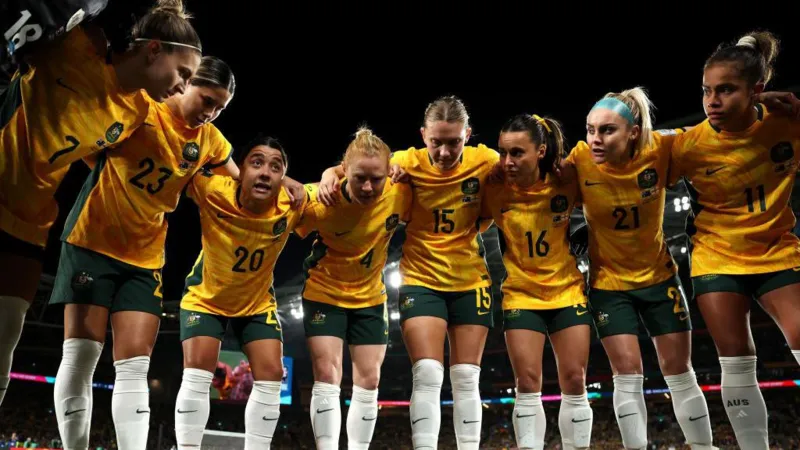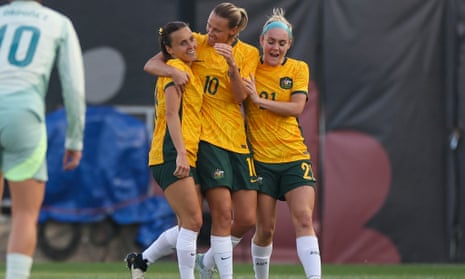
Marty Sheargold Loses Job Over Offensive Remarks About Women’s Football Team
Marty Sheargold, an Australian radio presenter, has parted ways with Triple M following misogynistic and disrespectful comments he made about the country’s women’s football team, the Matildas. His remarks, which were widely criticized as offensive, sparked outrage from fans, athletes, and organizations, leading to his departure from the radio network. The incident has sparked a broader conversation about the treatment of women’s sports and the role of media personalities in shaping public opinion.
Marty Sheargold’s Offensive Remarks: What Happened?
On Monday afternoon, during his drivetime show on Triple M, Marty Sheargold made several inappropriate and degrading comments about the Australian women’s football team. While discussing the Australian women’s national football team, the Matildas, and their recent performance in the SheBelieves Cup, Sheargold likened the players to “year 10 girls,” implying that their matches were uninteresting and filled with drama. He suggested that their infighting and personal issues were reminiscent of adolescent girls, dismissing the team’s accomplishments in a disrespectful manner.
In a further display of his lack of respect for the sport, Sheargold continued to make disparaging remarks about the SheBelieves Cup and the upcoming AFC Women’s Asian Cup. His comments about the tournament were laced with offensive language, and he even joked about preferring men’s sports over women’s football. These remarks, which were made in front of his co-hosts and broadcasted to a nationwide audience, sparked immediate backlash, both from the public and prominent figures in the sports world.
Public Backlash and Response from Football Australia

Mexico 0-2 Australia: international women’s football friendly
Following the comments, there was an outpouring of condemnation. The remarks quickly went viral, and the response from various sectors was swift. Minister for Sport Anika Wells called the comments “boorish, boring, and wrong.” She reminded the public that the Matildas’ semi-final match in the 2023 FIFA Women’s World Cup had become the most-watched television event in Australian history, with the Matildas’ quarterfinal match ranking as the second-most-watched event in the country’s history. This serves as a testament to the growing popularity and respect for women’s football in Australia.
Australian Olympian Ambrosia Malone, a member of the national hockey team, also expressed her disappointment on social media. She criticized Sheargold’s comments, pointing out how they could hurt young girls who were listening to the broadcast, potentially undermining their confidence and enthusiasm for sports. Malone expressed disbelief that such remarks could be acceptable on mainstream radio, especially during a time when women’s sports are growing in prominence.
Football Australia also issued a strong condemnation of Sheargold’s comments. In a statement, the organization expressed deep disappointment, noting that Sheargold’s remarks failed to acknowledge the significant impact the Matildas and women’s sports have had on Australian society. Football Australia also reminded the media of its responsibility to foster respectful discussions around women’s sports and to help build a supportive environment for female athletes.
Marty Sheargold Apologizes but Is Removed from Triple M
Triple M host Marty Sheargold forced to apologise for offensive on-air comments about Matildas
After facing significant backlash, Marty Sheargold issued an apology. He expressed regret for his comments, acknowledging the gravity of his words and the offense they caused. In his apology, Sheargold stated that he “fully understood the gravity” of his remarks and wished to sincerely apologize to the Matildas and the broader football community. However, his apology was not enough to quell the backlash, and it became clear that his actions had consequences.
Southern Cross Austereo (SCA), the parent company of Triple M, which is a major media organization in Australia, made the decision to part ways with Sheargold. The company announced that Sheargold and Triple M had agreed to “mutually part ways,” and he would not return to his usual time slot on air. SCA emphasized its commitment to upholding its responsibility to listeners, shareholders, and clients, ensuring that its programming aligns with the values and expectations of its audience. In a statement, SCA’s chief content officer, Dave Cameron, said that this incident should serve as a moment for reflection and review, highlighting the importance of maintaining respectful and constructive discussions in the media.
The Role of Media Personalities in Shaping Public Perception
The incident involving Marty Sheargold brings to light the powerful influence media personalities hold over public opinion, particularly when it comes to shaping the narrative around women’s sports. Media outlets, especially radio stations, have the ability to reach a wide audience and influence how people perceive athletes and the sports they participate in. In this case, Sheargold’s comments not only undermined the hard work and dedication of the Matildas but also reinforced harmful stereotypes about women’s sports being less entertaining or less serious than their male counterparts.
In Australia, the popularity of women’s football has been on the rise, with the Matildas achieving significant success on the international stage. Their performance in the 2023 FIFA Women’s World Cup and the increasing number of viewers for women’s football events show a growing support for the sport. However, Sheargold’s remarks reflect an ongoing struggle in many societies to fully accept and value women’s sports, which often face media bias and underrepresentation.
As a public figure, Sheargold’s comments reinforce the stereotype that women’s sports are inferior to men’s, and such attitudes can be damaging, particularly for young girls who aspire to be athletes. When influential personalities on mainstream platforms dismiss women’s sports in such a way, it sends a harmful message to the audience and discourages the next generation of female athletes.
The Impact of Sheargold’s Comments on the Matildas
For the Matildas, Sheargold’s comments were more than just an attack on their sport—they were a direct insult to the players who have dedicated their lives to achieving excellence. The Matildas have represented Australia on the global stage, showcasing their skills and determination in major tournaments like the FIFA Women’s World Cup. Their accomplishments have made them role models for young Australians, especially young girls, who now see that a career in professional sport is within reach.
Sheargold’s comments, which trivialized the team’s efforts and reduced their hard work to adolescent drama, sent a message that women’s achievements in sports are not to be taken seriously. For the Matildas, this was not only disrespectful but also detrimental to the progress of women’s sport in Australia.
A Turning Point for Women’s Sports in Australia?
While Sheargold’s comments were undoubtedly harmful, they also serve as a reminder of the importance of respectful dialogue and the need to continue pushing for gender equality in sports media. The swift and strong response from the public, athletes, and organizations like Football Australia shows that attitudes toward women’s sports are changing, and people are no longer willing to tolerate such misogyny.
The Matildas’ success on the global stage, combined with growing public support for women’s sports, signifies a turning point. As the visibility of women’s sports increases, so too does the need for media personalities and platforms to evolve and reflect these changes. Companies like Triple M and others in the media industry must hold their hosts accountable for their actions and ensure that their programming supports the values of respect, inclusivity, and equality.
Conclusion: The Need for Respect in Sports Media
Marty Sheargold’s departure from Triple M marks a significant moment in the ongoing discussion about respect for women’s sports. His comments about the Matildas, which were widely condemned as misogynistic and offensive, highlight the continuing challenges women face in the world of sports media. While the apology and subsequent departure from the network may be seen as a step toward accountability, it is crucial for the media industry as a whole to reflect on how it can better support and promote women’s sports.
As more people tune in to watch the Matildas and other female athletes, it is essential that media outlets create a more supportive and respectful environment. This incident serves as a stark reminder that the treatment of women’s sports should always be grounded in respect, and those in the media must be held accountable for their words and actions.




































































There are no comments yet. Be the first to comment!